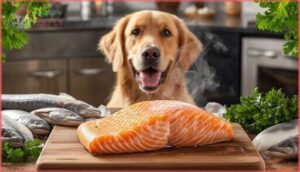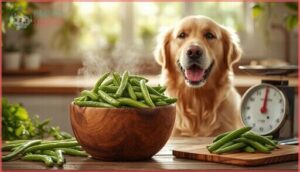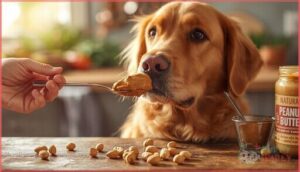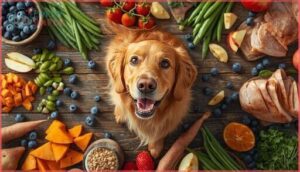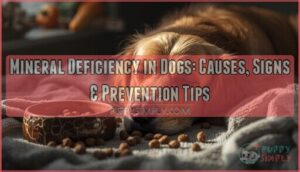This site is supported by our readers. We may earn a commission, at no cost to you, if you purchase through links.
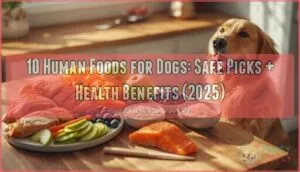
The key lies in knowing which foods deliver real health benefits, how to prepare them safely, and which seemingly harmless items could land your pet at the emergency vet. Understanding these distinctions transforms mealtime from a guessing game into a confidence-building routine where you can safely improve your dog’s nutrition with foods you already have at home.
Table Of Contents
- Key Takeaways
- Top 10 Human Foods Safe for Dogs
- Health Benefits of These Foods for Dogs
- How to Prepare Human Foods for Dogs
- Foods to Avoid When Feeding Dogs
- Tips for Safely Adding Human Foods to Dog Diets
- Frequently Asked Questions (FAQs)
- Can I feed my dog raw meat?
- What should I do if my dog eats chocolate or other toxic human foods?
- Can puppies eat the same human foods as adult dogs?
- Are sweet potatoes better raw or cooked?
- How much human food is too much daily?
- Can puppies eat the same human foods?
- What vegetables help dogs lose weight safely?
- Conclusion
Key Takeaways
- Many common kitchen foods like cooked chicken, fish, eggs, and vegetables offer real nutritional benefits for dogs when prepared plain (without seasoning, oils, or harmful additives) and served in proper portions under 10% of daily caloric intake.
- Certain human foods pose serious or fatal risks to dogs—chocolate, grapes, onions, garlic, and xylitol can cause anything from organ damage to life-threatening emergencies, even in small amounts.
- Proper preparation matters as much as ingredient choice: steaming and boiling preserve nutrients while eliminating bacteria, and all seasonings, oils, and additives must be removed before serving to avoid toxicity.
- Always consult your veterinarian before introducing new foods, monitor for allergic reactions through food diaries, and maintain nutritional balance by using human foods only as supplements to complete commercial dog food rather than replacements.
Top 10 Human Foods Safe for Dogs
You don’t have to stick to kibble alone regarding feeding your dog. Many foods from your kitchen can actually offer real nutritional benefits, as long as you prepare them properly and serve them in safe amounts.
Here are ten human foods that veterinarians commonly recommend for dogs.
Cooked, Unseasoned Chicken
Cooked, unseasoned chicken is one of the safest protein sources you can share with your dog. This lean meat provides about 31 grams of protein per 100 grams, supporting muscle health without excess fat. Boiling or steaming works best as cooking methods, preserving nutrients while eliminating harmful bacteria.
Remember, about 15% of dogs have chicken allergies, so watch for itching or digestive upset when introducing it. For safe chicken consumption, follow proper cooking safety guidelines to guarantee your dog’s health.
Cooked, Unseasoned Fish
Just like chicken, fish offers lean protein your dog can benefit from—and it brings something chicken doesn’t: omega-3 fatty acids. Salmon, cod, and whitefish are excellent choices, delivering around 300 mg EPA/DHA per 30 pounds of body weight.
Always cook fish to 145°F to eliminate bacteria, remove all bones, and skip seasonings. Mercury risks and fish allergies affect about 2% of dogs, so introduce carefully.
For more information on the benefits of fish, consider reading about fish based diets to make informed decisions.
Cooked, Unseasoned Eggs
Eggs are another protein powerhouse you can trust—one large egg delivers 5 grams of quality protein and essential vitamins like A, D, and E. Boil, scramble, or poach them plain, with no butter or salt.
Most dogs can enjoy 1–2 eggs per day, depending on size, but watch for signs of egg allergy, which affects about 4% of dogs.
Cooked Pumpkin
Plain, cooked pumpkin is a gentle ally for your dog’s digestive system. One cup provides 2.7 grams of fiber, which helps firm up loose stools or ease constipation—think of it as nature’s regulator.
It’s also loaded with vitamin A (12,100 IU per cup) for immune support and eye health.
Serve 1 teaspoon per 10 pounds of body weight, steamed or from canned 100% pure pumpkin.
Cooked Green Beans
This fiber-rich snack is a winner for canine weight loss and digestive health. One cup delivers just 31 calories but 2.7 grams of fiber, making cooked green beans excellent healthy dog treats that keep your pup satisfied.
They’re packed with vitamins A, C, and K—supporting immunity and vision.
Serve plain (steamed or boiled), cut into bite-size pieces, and watch for bean allergy risks during introduction.
Cooked Carrots
Your dog’s vision and gut health get a major boost from this orange veggie. One cup of cooked carrots delivers 21,400 IU of vitamin A and 3.6 grams of fiber, supporting canine vision and digestive balance.
Research shows carrot-derived fiber increases beneficial gut bacteria in dogs. Steam or boil them plain, then dice into small pieces—these healthy foods for dogs make nutrient-rich additions to any meal.
Cooked Spinach
A leafy green powerhouse, spinach nutrition delivers vitamins A, B, C, and K along with iron and antioxidants—making cooked unseasoned spinach one of the healthy snacks for dogs when served properly. However, oxalate risks require careful portion control in your dog nutrition and diet plan.
- Promotes digestive aid with 2.4 grams of fiber per 100 grams
- Enhances eye health through lutein and zeaxanthin antioxidants
- Strengthens heart function with folate and potassium
- Requires small servings—1/4 teaspoon for tiny dogs, 1 tablespoon maximum for giants
- Best steamed plain—these safe human foods for dogs and healthy treats need no seasonings
Apples (Sliced, in Moderation)
Crunchy sliced apples bring powerful apple nutrition to healthy snacking—86% water content aids canine hydration while vitamin C and fiber promote dog health and wellness.
These safe human foods for dogs help tackle dog obesity with only 100 calories per fruit.
Always remove seeds and cores, serve fresh fruit in bite-sized pieces, and limit portions to prevent digestive upset from natural sugars.
Bananas (in Moderation)
Think of bananas as nature’s energy bar for your pup—packed with 422 mg of potassium per fruit, they support muscle function and bone health.
These human foods dogs can eat deliver healthy snacks for dogs through vitamin B6, magnesium, and fiber that aid dog digestion and pet wellness.
Serve small pieces plain to prevent canine obesity and fruit allergies while maximizing banana nutrition and dog health benefits.
Peanut Butter (Unsweetened, Xylitol-Free)
Your pup’s tail wags for a reason—peanut butter packs 25% protein plus healthy fats that support canine health boosters like muscle maintenance and coat condition. Always choose xylitol-free foods, as this sweetener causes deadly liver failure.
These natural dog treats offer peanut butter benefits when fed right:
- Hide medications easily with its sticky texture
- Provide omega-6 fatty acids for skin health
- Deliver B vitamins for energy metabolism
- Use as high-value training rewards
- Keep dogs engaged when smeared in toys
Limit servings to ½ teaspoon twice daily for small dogs, 1 teaspoon for larger breeds—this prevents obesity while maximizing dog nutrition tips and human foods dogs can eat safely.
Health Benefits of These Foods for Dogs
Adding safe human foods to your dog’s diet isn’t just about variety—it can actually support their overall health in meaningful ways. These whole foods bring specific nutrients that help with everything from digestion to immunity.
Let’s look at the key health benefits your dog can gain from these nutritious options.
Supporting Digestive Health
Foods like cooked green beans, cooked carrots, and cooked oatmeal offer significant digestive health benefits for your dog. Their fiber content aids nutrient absorption and promotes a balanced gut microbiome.
These foods create probiotic effects by encouraging beneficial bacteria growth, while their natural digestive enzymes help break down meals more efficiently.
Fiber supplements aren’t always necessary when you’re feeding whole, properly prepared foods that naturally aid your dog’s digestive system.
Boosting Immunity and Energy
Beyond keeping digestion on track, the right foods can power up your dog’s immune system and energy levels. Around 65% of immune cells live in your dog’s gut, so what you feed directly impacts their ability to fight illness and stay active.
The right foods can strengthen your dog’s immunity and energy, since 65% of immune cells live in the gut
Here’s how safe human foods support canine wellness:
- Spinach and blueberries deliver antioxidants that reduce inflammation and protect cells from damage
- Cooked chicken and fish provide essential amino acids your dog needs to build antibodies and maintain healthy digestion
- Pumpkin and sweet potatoes offer vitamin C and beta-carotene, strengthening cellular immune response
- Salmon supplies omega-3 fatty acids that combat inflammation while supporting nutrient absorption and sustained energy
These whole foods don’t just fill your dog’s bowl—they actively boost immune function and vitality when served in moderation.
Improving Skin and Coat Condition
A shiny coat signals good health from the inside out. Foods rich in omega-3 fatty acids—like salmon—can reduce skin inflammation by up to 65% in allergic dogs, while vitamin E strengthens coat quality.
Biotin supplements resolve coat issues in 60% of cases within weeks. Coconut provides linoleic acid for skin hydration, and hypoallergenic diets improve dermatitis when food sensitivities cause dullness or itching.
Enhancing Eye and Heart Health
Just as healthy skin reflects inner wellness, your dog’s eyes and cardiovascular system benefit from specific nutrients. Carrots and sweet potatoes supply vitamin A and antioxidants for vision support, protecting dogs’ eye health as they age.
Meanwhile, fish delivers omega-3 fatty acids that improve dog heart health by reducing arrhythmias and inflammation. These omega-rich foods offer antioxidant benefits, providing eye protection and heart health advantages simultaneously.
How to Prepare Human Foods for Dogs
Preparing human foods for your dog doesn’t have to be complicated, but it does require some attention to detail. The way you cook, season, and serve these foods can make the difference between a healthy treat and a potential problem.
Let’s walk through the key steps to safely prepare human foods that will keep your dog happy and healthy.
Cooking Methods (Steaming, Boiling, Baking)
You’ll want to cook vegetables and proteins properly to keep nutrients intact and guarantee safety. Steaming benefits include preserving up to 90% of vitamins, while boiling techniques for meats like cooked unseasoned chicken, turkey, beef, or fish require reaching 165°F to eliminate bacteria. Baking safety matters too—avoid charring, which can create harmful compounds.
Here’s your quick guide to cooking guidelines:
- Steam veggies to retain magnesium and potassium
- Boil lean proteins thoroughly without excess water
- Bake at moderate temperatures to preserve nutrient retention
Cooked oatmeal also makes a gentle, fiber-rich addition when prepared simply.
Portion Sizes and Frequency
Getting dog food portion control right protects your pup from weight gain and digestive upset. Treats and human foods should stay under 10% of your dog’s total daily caloric intake, while the remaining 90% comes from balanced dog food. Dividing meals into 2–3 feedings promotes healthy dog treats practices and nutrient balance.
Meal frequency matters—spreading portions across the day prevents bloating and aids steady energy. Monitor serving sizes carefully, especially with calorie-dense options like peanut butter or cheese. These dog dietary restrictions help maintain ideal dog health and diet tips while letting you share safe, nutritious human foods as part of daily feeding routines.
| Dog Size | Daily Human Food Limit |
|---|---|
| Small (10–20 lbs) | 1–2 tablespoons |
| Medium (20–50 lbs) | 2–4 tablespoons |
| Large (50+ lbs) | 4–6 tablespoons |
| Extra-Large (80+ lbs) | 6–8 tablespoons |
| Puppies | Consult your vet first |
Removing Harmful Additives and Seasonings
Before feeding human foods to dogs, strip away salt, spices, butter, and oils—especially garlic powder and onion powder, which trigger anemia. Even cooked unseasoned turkey, cooked unseasoned beef, and cooked unseasoned fish deliver natural ingredients without chemical contamination.
Rinse canned vegetables to remove excess sodium, choose additive-free options, and prioritize pet food safety with healthy alternatives that support dog food and allergies prevention.
Serving Suggestions and Mixing With Dog Food
Mix cooked unseasoned turkey or other approved human foods for dogs with kibble using portion control. Limit these additions to 10% of daily caloric intake to maintain nutrient balance.
Start with a gradual food shift, blending 20% human food initially, then increasing over four to seven days.
This meal mixing approach aids dog health and diet tips while protecting safe human food options without overwhelming your dog’s system.
Foods to Avoid When Feeding Dogs
While many human foods can benefit your dog, some pose serious health risks that every pet owner needs to know about. Certain ingredients can cause anything from mild digestive upset to life-threatening emergencies, even in small amounts.
Let’s look at the foods you should always keep away from your dog to protect their health and safety.
Toxic Foods (Chocolate, Grapes, Onions, Etc.)
Some foods we love are poison to our dogs—and the consequences can be life-threatening. Chocolate poisoning, grape toxicity, and onion allergies top the list of toxic foods for dogs. Even small amounts trigger pet emergency care situations, so dog poisoning prevention starts with knowing which unsafe foods for dogs to keep locked away.
- Chocolate contains theobromine, causing rapid heart rate, tremors, and seizures—dark chocolate poses the highest risk
- Grapes and raisins damage kidneys, with toxicity occurring from just a handful and symptoms starting within hours
- Onions and garlic destroy red blood cells, leading to weakness and anemia days after ingestion
Unsafe Additives and Ingredients
Beyond toxic foods for dogs, artificial preservatives like BHA and BHT hide in many shelf-stable treats, linked to liver damage and cancer in lab animals. Xylitol, a synthetic additive in sugar-free products, causes deadly hypoglycemia within 30 minutes.
Watch for toxic fillers, chemical contaminants, and heavy metals too. Studies show 100% of tested dog foods exceeded safe mercury limits, while food allergies in dogs often trace back to unsafe additives.
Risks of Raw and Processed Human Foods
Raw food diets carry serious bacterial contamination risks—nearly 25% test positive for Salmonella and Listeria, increasing zoonotic diseases and foodborne illnesses in your home. Dogs fed raw meat shed harmful pathogens through saliva and feces, even when healthy.
Ultra-processed human foods also threaten dog food safety, linked to nutrient imbalance, gastrointestinal risks, and chronic conditions like obesity and inflammation.
Tips for Safely Adding Human Foods to Dog Diets
Adding human foods to your dog’s meals can be a great way to boost nutrition and variety, but it’s important to do it the right way.
A few simple steps can help you avoid common mistakes and keep your dog healthy. Here’s what you need to know before you start sharing your plate.
Consulting Your Veterinarian
Before you introduce any new human foods, schedule a consultation with your veterinarian. This step matters more than you might think—73% of veterinarians recommend it to prevent dietary imbalances. Your vet will provide veterinary guidance customized to your dog’s unique needs, including:
- Diet assessment based on your dog’s medical history and current health
- Nutrition planning to guarantee balanced canine nutrition and pet wellness
- Consultation benefits like dog health and diet tips, plus ongoing support for dog food and allergies
Professional veterinarian advice keeps your pup safe.
Monitoring for Food Allergies and Sensitivities
After getting the green light from your vet, keep a Food Diary to track what you’re feeding and watch for signs of dog food allergies.
Symptom Tracking matters—about 10-15% of dogs experience food allergies, showing up as itchy paws, ear infections, or tummy trouble.
If you notice unusual reactions after Dietary Changes, Reaction Monitoring helps you catch dog health concerns early and adjust accordingly.
Maintaining Balanced Nutrition
Once you’ve tracked your dog’s reactions, focus on Nutrient Ratios to keep their Balanced diet for dogs on track. Human foods shouldn’t exceed 10% of daily Caloric Intake—remember, even small amounts can disrupt Essential nutrients your dog needs.
Regular Dietary Assessments help you spot gaps early, and Nutrient Supplementation may be necessary if you’re mixing homemade meals with commercial food to meet all Nutritional needs of dogs.
Using Human Foods as Treats or Meal Toppers
Human foods for dogs work beautifully as treats and food toppers when you follow Meal Topping Guidelines carefully. Choose lean meats or veggies over processed options, honoring your Pet Owner Responsibilities while satisfying Canine Dietary Needs safely.
Keep Dog Nutrition Plans balanced by limiting healthy snacks to under 10% of daily calories—what seems like a small piece of cheese can equal several meals for smaller breeds.
Frequently Asked Questions (FAQs)
Can I feed my dog raw meat?
Feeding raw meat carries real risks for your dog and family. Bacterial contamination with Salmonella or Listeria is common in raw diets, and nutritional imbalances often occur without expert formulation—cooked options are safer.
What should I do if my dog eats chocolate or other toxic human foods?
Picture a ticking clock—time matters most when toxic food meets your dog’s stomach. Remove the source immediately, note what they ate, and contact your veterinarian or pet poisoning hotline without delay for emergency guidance.
Can puppies eat the same human foods as adult dogs?
No, puppies can’t eat the same human foods as adult dogs. Their developing digestive enzymes and gut microbiome make them more sensitive. Stick to puppy-specific nutrition until they’re fully grown.
Are sweet potatoes better raw or cooked?
Cooked clearly wins for canine care. Cooking sweet potatoes boosts digestibility, enhances nutrient retention, and eliminates toxicity concerns tied to resistant starch and solanine.
Steaming or boiling optimizes fiber and digestive health benefits.
How much human food is too much daily?
Your dog’s human food intake shouldn’t exceed 10% of their total daily calories. This treat limit helps prevent obesity risks, which affects roughly 59% of dogs, and requires careful portion control and food monitoring for balanced diet maintenance.
Can puppies eat the same human foods?
Your growing pup has different nutritional needs than adult dogs, so most human foods aren’t suitable.
Safe foods like plain cooked chicken require proper preparation and veterinary guidelines to support healthy development.
What vegetables help dogs lose weight safely?
Low-calorie vegetables like green beans, carrots, and cucumbers support weight loss in your dog’s diet. Their fiber content promotes satiety, while high water content adds volume without extra calories, helping manage portion sizes safely.
Conclusion
Studies show that 68% of dog owners share human food with their pets, yet many don’t know which options are truly safe. You now have the knowledge to confidently choose from 10 human foods for dogs that deliver real nutritional benefits.
By preparing these foods properly, consulting your veterinarian, and avoiding toxic ingredients, you’re not just sharing meals—you’re actively supporting your dog’s health with every bite. Your kitchen has become a wellness toolkit.
- https://www.poochandmutt.co.uk/blogs/nutrition/pooch-parents-do-you-feed-your-dog-human-food
- https://www.medicalnewstoday.com/articles/324453
- http://petsofthehomeless.org/can-dogs-eat-human-food/
- https://www.nature.com/articles/s41598-023-27866-z
- https://www.avma.org/news/how-dog-owner-feeding-choices-correlate-nutritional-health-outcomes


